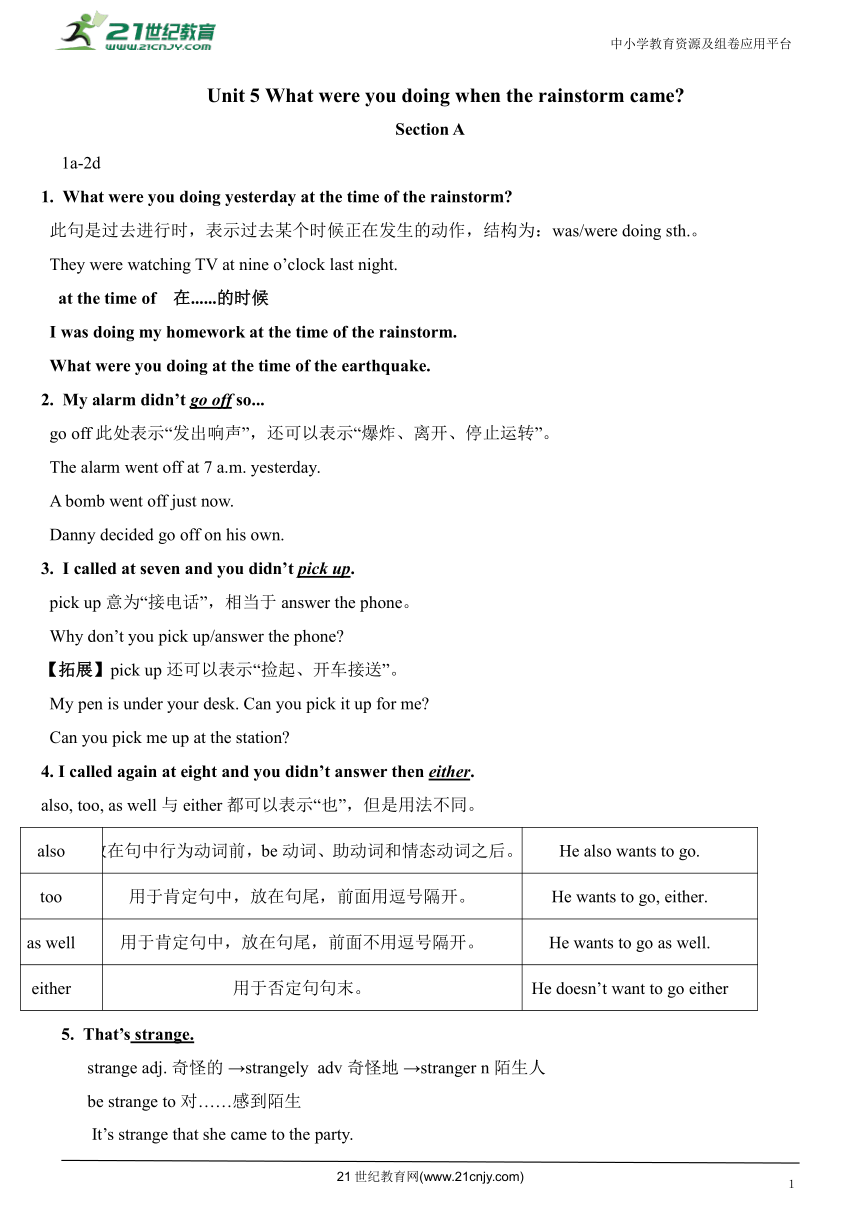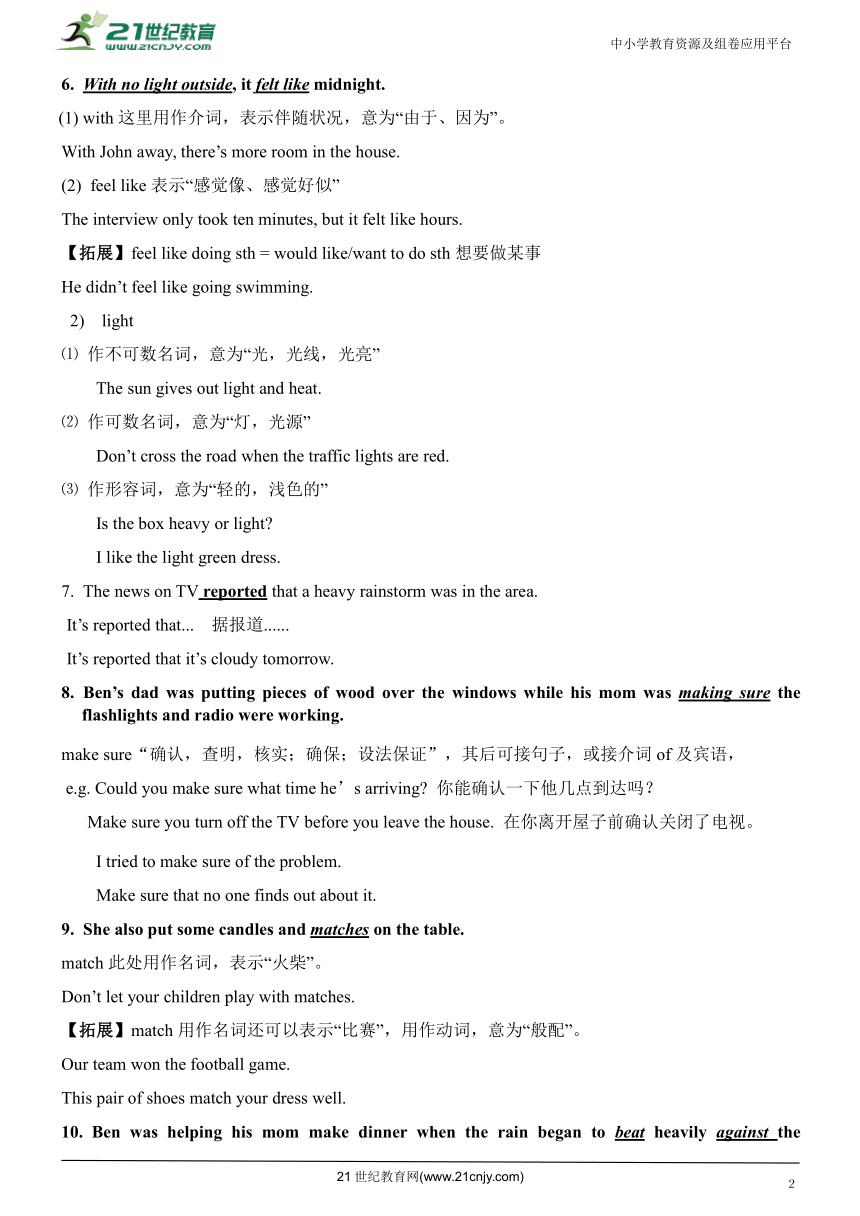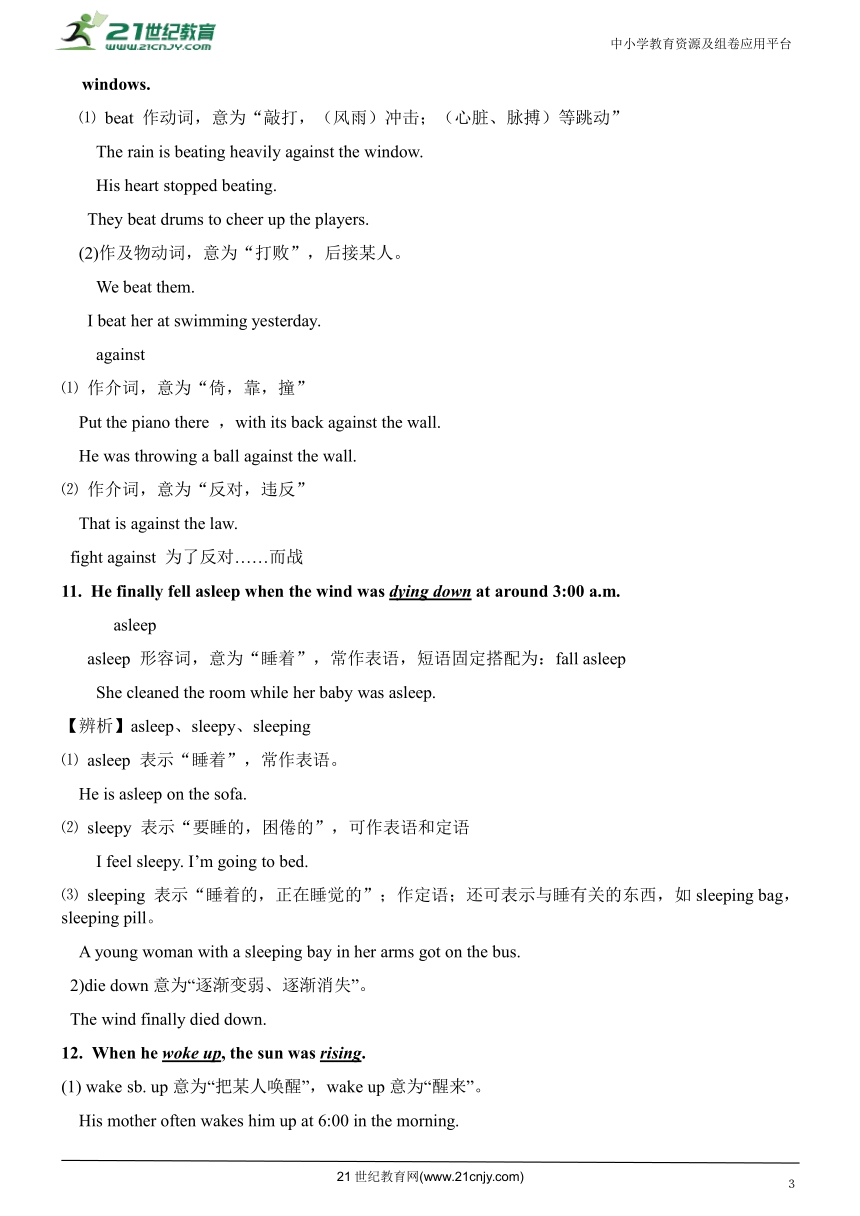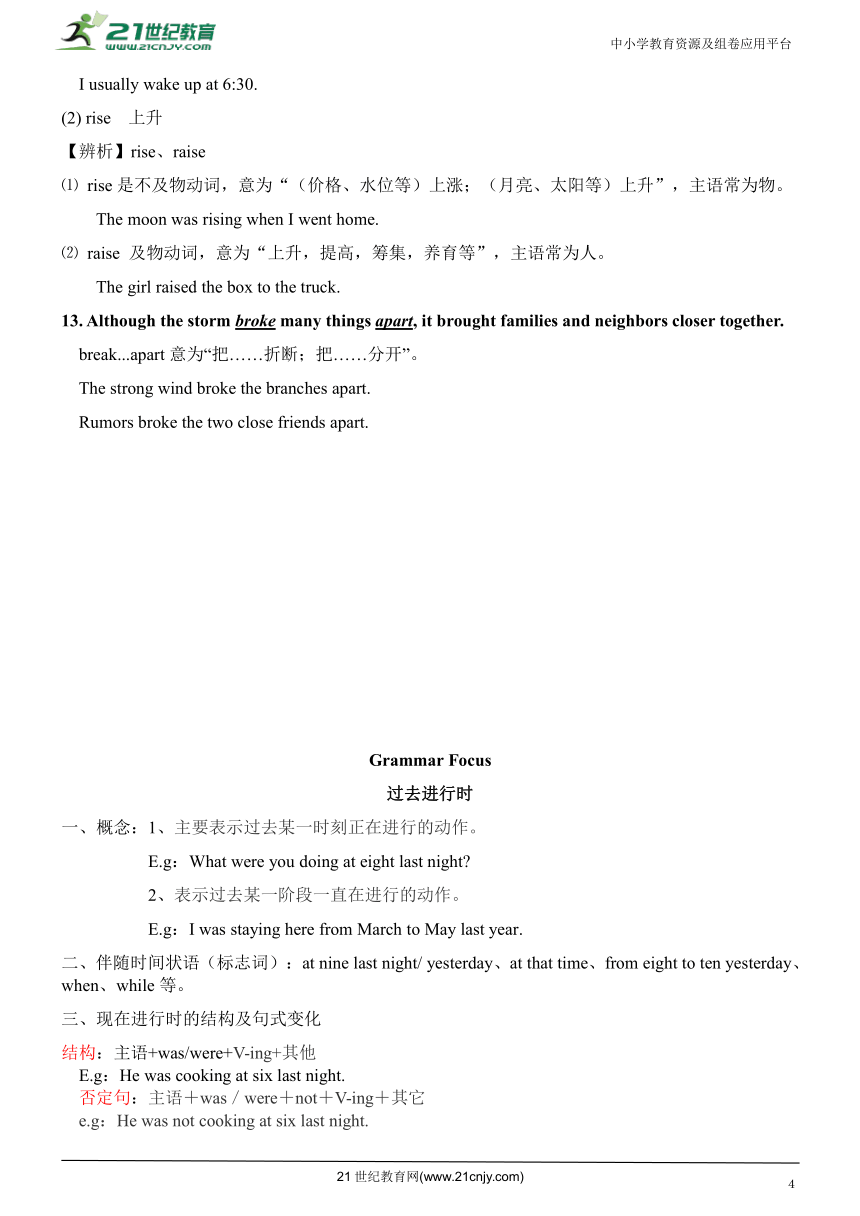Unit 5 What were you doing when the rainstorm came.知识点总结归纳【人教版八年级下册英语】
文档属性
| 名称 | Unit 5 What were you doing when the rainstorm came.知识点总结归纳【人教版八年级下册英语】 |  | |
| 格式 | docx | ||
| 文件大小 | 58.4KB | ||
| 资源类型 | 试卷 | ||
| 版本资源 | 人教新目标(Go for it)版 | ||
| 科目 | 英语 | ||
| 更新时间 | 2024-05-16 21:03:05 | ||
图片预览




文档简介
中小学教育资源及组卷应用平台
Unit 5 What were you doing when the rainstorm came
Section A
1a-2d
What were you doing yesterday at the time of the rainstorm
此句是过去进行时,表示过去某个时候正在发生的动作,结构为:was/were doing sth.。
They were watching TV at nine o’clock last night.
at the time of 在......的时候
I was doing my homework at the time of the rainstorm.
What were you doing at the time of the earthquake.
My alarm didn’t go off so...
go off此处表示“发出响声”,还可以表示“爆炸、离开、停止运转”。
The alarm went off at 7 a.m. yesterday.
A bomb went off just now.
Danny decided go off on his own.
I called at seven and you didn’t pick up.
pick up意为“接电话”,相当于answer the phone。
Why don’t you pick up/answer the phone
【拓展】pick up还可以表示“捡起、开车接送”。
My pen is under your desk. Can you pick it up for me
Can you pick me up at the station
4. I called again at eight and you didn’t answer then either.
also, too, as well与either都可以表示“也”,但是用法不同。
also 放在句中行为动词前,be动词、助动词和情态动词之后。 He also wants to go.
too 用于肯定句中,放在句尾,前面用逗号隔开。 He wants to go, either.
as well 用于肯定句中,放在句尾,前面不用逗号隔开。 He wants to go as well.
either 用于否定句句末。 He doesn’t want to go either
That’s strange.
strange adj. 奇怪的 →strangely adv奇怪地 →stranger n 陌生人
be strange to 对……感到陌生
It’s strange that she came to the party.
With no light outside, it felt like midnight.
(1) with这里用作介词,表示伴随状况,意为“由于、因为”。
With John away, there’s more room in the house.
feel like表示“感觉像、感觉好似”
The interview only took ten minutes, but it felt like hours.
【拓展】feel like doing sth = would like/want to do sth想要做某事
He didn’t feel like going swimming.
light
⑴ 作不可数名词,意为“光,光线,光亮”
The sun gives out light and heat.
⑵ 作可数名词,意为“灯,光源”
Don’t cross the road when the traffic lights are red.
⑶ 作形容词,意为“轻的,浅色的”
Is the box heavy or light
I like the light green dress.
The news on TV reported that a heavy rainstorm was in the area.
It’s reported that... 据报道......
It’s reported that it’s cloudy tomorrow.
Ben’s dad was putting pieces of wood over the windows while his mom was making sure the flashlights and radio were working.
make sure“确认,查明,核实;确保;设法保证”,其后可接句子,或接介词 of及宾语,
e.g. Could you make sure what time he’s arriving 你能确认一下他几点到达吗?
Make sure you turn off the TV before you leave the house. 在你离开屋子前确认关闭了电视。
I tried to make sure of the problem.
Make sure that no one finds out about it.
She also put some candles and matches on the table.
match此处用作名词,表示“火柴”。
Don’t let your children play with matches.
【拓展】match用作名词还可以表示“比赛”,用作动词,意为“般配”。
Our team won the football game.
This pair of shoes match your dress well.
Ben was helping his mom make dinner when the rain began to beat heavily against the windows.
⑴ beat 作动词,意为“敲打,(风雨)冲击;(心脏、脉搏)等跳动”
The rain is beating heavily against the window.
His heart stopped beating.
They beat drums to cheer up the players.
(2)作及物动词,意为“打败”,后接某人。
We beat them.
I beat her at swimming yesterday.
against
⑴ 作介词,意为“倚,靠,撞”
Put the piano there ,with its back against the wall.
He was throwing a ball against the wall.
⑵ 作介词,意为“反对,违反”
That is against the law.
fight against 为了反对……而战
He finally fell asleep when the wind was dying down at around 3:00 a.m.
asleep
asleep 形容词,意为“睡着”,常作表语,短语固定搭配为:fall asleep
She cleaned the room while her baby was asleep.
【辨析】asleep、sleepy、sleeping
⑴ asleep 表示“睡着”,常作表语。
He is asleep on the sofa.
⑵ sleepy 表示“要睡的,困倦的”,可作表语和定语
I feel sleepy. I’m going to bed.
⑶ sleeping 表示“睡着的,正在睡觉的”;作定语;还可表示与睡有关的东西,如sleeping bag,sleeping pill。
A young woman with a sleeping bay in her arms got on the bus.
2)die down意为“逐渐变弱、逐渐消失”。
The wind finally died down.
When he woke up, the sun was rising.
(1) wake sb. up意为“把某人唤醒”,wake up意为“醒来”。
His mother often wakes him up at 6:00 in the morning.
I usually wake up at 6:30.
(2) rise 上升
【辨析】rise、raise
⑴ rise是不及物动词,意为“(价格、水位等)上涨;(月亮、太阳等)上升”,主语常为物。
The moon was rising when I went home.
⑵ raise 及物动词,意为“上升,提高,筹集,养育等”,主语常为人。
The girl raised the box to the truck.
13. Although the storm broke many things apart, it brought families and neighbors closer together.
break...apart意为“把……折断;把……分开”。
The strong wind broke the branches apart.
Rumors broke the two close friends apart.
Grammar Focus
过去进行时
一、概念:1、主要表示过去某一时刻正在进行的动作。
E.g:What were you doing at eight last night
2、表示过去某一阶段一直在进行的动作。
E.g:I was staying here from March to May last year.
二、伴随时间状语(标志词):at nine last night/ yesterday、at that time、from eight to ten yesterday、when、while等。
三、现在进行时的结构及句式变化
结构:主语+was/were+V-ing+其他
E.g:He was cooking at six last night.
否定句:主语+was/were+not+V-ing+其它
e.g:He was not cooking at six last night.
一般疑问句:疑问句: Was/Were +主语+V-ing+其它
Yes, 主语+was/ were. No, 主语+wasn’t/weren’t.
E.g:Was he cooking at six last night
特殊疑问句:特殊疑问词+一般疑问句
E.g:What was he doing at six last night
四、现在分词的变化规则
(1) 在动词后加-ing:work-working
(2) 在-e结尾动词,去e 加-ing:make-making
(3) 以重读闭音节或r音节结尾且末尾只有一个辅音字母动词,要双写末尾的辅音字母再加-ing:cut-cutting; prefer-preferring
(4) 以-ie结尾的词,将ie改为y,再加-ing:lie-lying
五 过去进行时中的when和while
Jim was reading when the teacher came in.
当老师进来的时候,吉姆正在读书。
Jim was reading while Kate was watching TV.
在凯特正在看电视的同时,吉姆正在读书。
Jim came in while Kate was watching TV.
在凯特正在看电视的时候,吉姆进来了。
when, while 区别:
1) when: 既指时间点,也可指一段时间
while: 只表示一段时间
when引导的时间状语从句中的动词可以是瞬间性动词,也可是延续性动词
The sun was rising when we got to the top of the mountain.
I was just reading a book when she came into my room.
We were having dinner when the phone rang.
while从句中的动词必须是延续性动词
While my sister was doing the ironing, I cooked dinner.
He fell asleep while he was listening to music.
While Mary was writing a letter, the children were playing outside.
1) 由when引导的时间状语从句,主句用过去进行时,从句应用一般过去时; 由while引导的时间状语从句,主句用一般过去时,从句应用过去进行时。
When the teacher came in, we were talking.
当此句改变主从句的位置时,则为: While we were talking, the teacher came in.
如果从句和主句的动作同时发生,两句都用过去进行时的时候,多用while引导。如:
They were singing while we were dancing.
While Linda was sleeping, Jenny was helping Mary with her homework.
Section B
Kate realized her bag was still at home.
realize用作及物动词,意为“理解、领会、意识到”,后接名词、代词或者从句作宾语。
He didn’t realize his mistake.
The man laughed when he realized what happened.
I realized the importance of this things.
When the school basketball competition started, Kate was still making her way to school.
make one’s way to意为“前往……”,后接表示地点的名词。
We slowly made our way to the mall through the crowd.
Robert Allen is now over 50, but he was a school pupil at that time.
over此处表示“超过、多于”,相当于more than。
She stayed in Lagos for over a month.
He is over sixty.
We were eating dinner in the kitchen when we heard the news on the radio.
on the radio表示“通过广播、通过录音机”,on此处用作介词,表示“借助、以某种方式”,后常接表示媒介的名词。
She is watching the show on TV.
My parents did not talk after that, and we finished the rest of our dinner in silence.
(1) rest此处表示“其余的部分”,the rest of意为“其余的……、其它的……”,后可接可数名词后者不可数名词,当在句中作主语时,谓语动词的单复数与of后面的名词保持一致,若of后面的名词是单数可数名词或者不可数名词,谓语动词用单数形式;若of后面的名词是可数名词复数,谓语动词用复数形式。
The rest of the money is on the desk.
The rest of the bread is bad.
The rest of the students went to Beijing.
Some of the students are reading in the classroom and the rest of them are on the playground.
in silence意为“沉默、无声”。
She stood by the window in silence for a long time.
More recently, most Americans remember what they were doing when the World Trade Center in New York was taken down by terrorists.
recently用作副词,意为“近来、最近”,常与现在完成时连用。
Have you called your mother recently
take down意为“拆除、拆掉”,还可以表示“写下、记下”。
Could you please help me take down this tent
I forgot to take down his telephone number.
I didn’t believe him at first, but then I looked out of the window and realized that it was true.
at first意为“起初、起先”,多用于句首或者句尾,暗示与后来的动作或者情况不同,与at last“最后、最终”相对。
The work was hard at first, but I got used to it later.
I was so scared that I could hardly think clearly after that.
hardly用作副词,表示“几乎不、几乎没有”。
She hardly ate anything today.
There is hardly any milk left in the ridge.
Kate didn’t think her friend was telling the truth about the event.
truth用作名词,表示“实情、事实”, true形容词 真实的
I must tell you the truth.
This is a true story.
(to) tell the truth表示“说实话”。
I had trouble thinking clearly after I was very afraid.
trouble n 困难; 苦恼; 忧虑
⑴ in trouble 处于困境中 get sb. into trouble 使某人陷入困境
⑵ What's the trouble with you = What’s the matter with you
= Wha’t wrong with you 你怎么啦?
⑶ have trouble (in)doing sth 做某事有麻烦
have problem /difficulty/fun (in) doing sth 做某事有问题/困难/乐趣
作文
Susanna所在的城市昨天晚上发生了一场地震。很幸运,地震并不强烈,他们全家安然无恙。假如你是Susanna请描述一下地震发生时家里人的活动情景,80词左右。
My name is Susanna. In our city, there was an earthquake at 8:32 yesterday evening.
At that time, I was taking a shower in the bathroom. My mother was cleaning up the kitchen and my father was watching TV in the living room. My elder sister Alice was working on her computer in her room. We were very scared.
Luckily, the earthquake was not heavy and it didn’t last long. And we were all safe.
21世纪教育网(www.21cnjy.com)
Unit 5 What were you doing when the rainstorm came
Section A
1a-2d
What were you doing yesterday at the time of the rainstorm
此句是过去进行时,表示过去某个时候正在发生的动作,结构为:was/were doing sth.。
They were watching TV at nine o’clock last night.
at the time of 在......的时候
I was doing my homework at the time of the rainstorm.
What were you doing at the time of the earthquake.
My alarm didn’t go off so...
go off此处表示“发出响声”,还可以表示“爆炸、离开、停止运转”。
The alarm went off at 7 a.m. yesterday.
A bomb went off just now.
Danny decided go off on his own.
I called at seven and you didn’t pick up.
pick up意为“接电话”,相当于answer the phone。
Why don’t you pick up/answer the phone
【拓展】pick up还可以表示“捡起、开车接送”。
My pen is under your desk. Can you pick it up for me
Can you pick me up at the station
4. I called again at eight and you didn’t answer then either.
also, too, as well与either都可以表示“也”,但是用法不同。
also 放在句中行为动词前,be动词、助动词和情态动词之后。 He also wants to go.
too 用于肯定句中,放在句尾,前面用逗号隔开。 He wants to go, either.
as well 用于肯定句中,放在句尾,前面不用逗号隔开。 He wants to go as well.
either 用于否定句句末。 He doesn’t want to go either
That’s strange.
strange adj. 奇怪的 →strangely adv奇怪地 →stranger n 陌生人
be strange to 对……感到陌生
It’s strange that she came to the party.
With no light outside, it felt like midnight.
(1) with这里用作介词,表示伴随状况,意为“由于、因为”。
With John away, there’s more room in the house.
feel like表示“感觉像、感觉好似”
The interview only took ten minutes, but it felt like hours.
【拓展】feel like doing sth = would like/want to do sth想要做某事
He didn’t feel like going swimming.
light
⑴ 作不可数名词,意为“光,光线,光亮”
The sun gives out light and heat.
⑵ 作可数名词,意为“灯,光源”
Don’t cross the road when the traffic lights are red.
⑶ 作形容词,意为“轻的,浅色的”
Is the box heavy or light
I like the light green dress.
The news on TV reported that a heavy rainstorm was in the area.
It’s reported that... 据报道......
It’s reported that it’s cloudy tomorrow.
Ben’s dad was putting pieces of wood over the windows while his mom was making sure the flashlights and radio were working.
make sure“确认,查明,核实;确保;设法保证”,其后可接句子,或接介词 of及宾语,
e.g. Could you make sure what time he’s arriving 你能确认一下他几点到达吗?
Make sure you turn off the TV before you leave the house. 在你离开屋子前确认关闭了电视。
I tried to make sure of the problem.
Make sure that no one finds out about it.
She also put some candles and matches on the table.
match此处用作名词,表示“火柴”。
Don’t let your children play with matches.
【拓展】match用作名词还可以表示“比赛”,用作动词,意为“般配”。
Our team won the football game.
This pair of shoes match your dress well.
Ben was helping his mom make dinner when the rain began to beat heavily against the windows.
⑴ beat 作动词,意为“敲打,(风雨)冲击;(心脏、脉搏)等跳动”
The rain is beating heavily against the window.
His heart stopped beating.
They beat drums to cheer up the players.
(2)作及物动词,意为“打败”,后接某人。
We beat them.
I beat her at swimming yesterday.
against
⑴ 作介词,意为“倚,靠,撞”
Put the piano there ,with its back against the wall.
He was throwing a ball against the wall.
⑵ 作介词,意为“反对,违反”
That is against the law.
fight against 为了反对……而战
He finally fell asleep when the wind was dying down at around 3:00 a.m.
asleep
asleep 形容词,意为“睡着”,常作表语,短语固定搭配为:fall asleep
She cleaned the room while her baby was asleep.
【辨析】asleep、sleepy、sleeping
⑴ asleep 表示“睡着”,常作表语。
He is asleep on the sofa.
⑵ sleepy 表示“要睡的,困倦的”,可作表语和定语
I feel sleepy. I’m going to bed.
⑶ sleeping 表示“睡着的,正在睡觉的”;作定语;还可表示与睡有关的东西,如sleeping bag,sleeping pill。
A young woman with a sleeping bay in her arms got on the bus.
2)die down意为“逐渐变弱、逐渐消失”。
The wind finally died down.
When he woke up, the sun was rising.
(1) wake sb. up意为“把某人唤醒”,wake up意为“醒来”。
His mother often wakes him up at 6:00 in the morning.
I usually wake up at 6:30.
(2) rise 上升
【辨析】rise、raise
⑴ rise是不及物动词,意为“(价格、水位等)上涨;(月亮、太阳等)上升”,主语常为物。
The moon was rising when I went home.
⑵ raise 及物动词,意为“上升,提高,筹集,养育等”,主语常为人。
The girl raised the box to the truck.
13. Although the storm broke many things apart, it brought families and neighbors closer together.
break...apart意为“把……折断;把……分开”。
The strong wind broke the branches apart.
Rumors broke the two close friends apart.
Grammar Focus
过去进行时
一、概念:1、主要表示过去某一时刻正在进行的动作。
E.g:What were you doing at eight last night
2、表示过去某一阶段一直在进行的动作。
E.g:I was staying here from March to May last year.
二、伴随时间状语(标志词):at nine last night/ yesterday、at that time、from eight to ten yesterday、when、while等。
三、现在进行时的结构及句式变化
结构:主语+was/were+V-ing+其他
E.g:He was cooking at six last night.
否定句:主语+was/were+not+V-ing+其它
e.g:He was not cooking at six last night.
一般疑问句:疑问句: Was/Were +主语+V-ing+其它
Yes, 主语+was/ were. No, 主语+wasn’t/weren’t.
E.g:Was he cooking at six last night
特殊疑问句:特殊疑问词+一般疑问句
E.g:What was he doing at six last night
四、现在分词的变化规则
(1) 在动词后加-ing:work-working
(2) 在-e结尾动词,去e 加-ing:make-making
(3) 以重读闭音节或r音节结尾且末尾只有一个辅音字母动词,要双写末尾的辅音字母再加-ing:cut-cutting; prefer-preferring
(4) 以-ie结尾的词,将ie改为y,再加-ing:lie-lying
五 过去进行时中的when和while
Jim was reading when the teacher came in.
当老师进来的时候,吉姆正在读书。
Jim was reading while Kate was watching TV.
在凯特正在看电视的同时,吉姆正在读书。
Jim came in while Kate was watching TV.
在凯特正在看电视的时候,吉姆进来了。
when, while 区别:
1) when: 既指时间点,也可指一段时间
while: 只表示一段时间
when引导的时间状语从句中的动词可以是瞬间性动词,也可是延续性动词
The sun was rising when we got to the top of the mountain.
I was just reading a book when she came into my room.
We were having dinner when the phone rang.
while从句中的动词必须是延续性动词
While my sister was doing the ironing, I cooked dinner.
He fell asleep while he was listening to music.
While Mary was writing a letter, the children were playing outside.
1) 由when引导的时间状语从句,主句用过去进行时,从句应用一般过去时; 由while引导的时间状语从句,主句用一般过去时,从句应用过去进行时。
When the teacher came in, we were talking.
当此句改变主从句的位置时,则为: While we were talking, the teacher came in.
如果从句和主句的动作同时发生,两句都用过去进行时的时候,多用while引导。如:
They were singing while we were dancing.
While Linda was sleeping, Jenny was helping Mary with her homework.
Section B
Kate realized her bag was still at home.
realize用作及物动词,意为“理解、领会、意识到”,后接名词、代词或者从句作宾语。
He didn’t realize his mistake.
The man laughed when he realized what happened.
I realized the importance of this things.
When the school basketball competition started, Kate was still making her way to school.
make one’s way to意为“前往……”,后接表示地点的名词。
We slowly made our way to the mall through the crowd.
Robert Allen is now over 50, but he was a school pupil at that time.
over此处表示“超过、多于”,相当于more than。
She stayed in Lagos for over a month.
He is over sixty.
We were eating dinner in the kitchen when we heard the news on the radio.
on the radio表示“通过广播、通过录音机”,on此处用作介词,表示“借助、以某种方式”,后常接表示媒介的名词。
She is watching the show on TV.
My parents did not talk after that, and we finished the rest of our dinner in silence.
(1) rest此处表示“其余的部分”,the rest of意为“其余的……、其它的……”,后可接可数名词后者不可数名词,当在句中作主语时,谓语动词的单复数与of后面的名词保持一致,若of后面的名词是单数可数名词或者不可数名词,谓语动词用单数形式;若of后面的名词是可数名词复数,谓语动词用复数形式。
The rest of the money is on the desk.
The rest of the bread is bad.
The rest of the students went to Beijing.
Some of the students are reading in the classroom and the rest of them are on the playground.
in silence意为“沉默、无声”。
She stood by the window in silence for a long time.
More recently, most Americans remember what they were doing when the World Trade Center in New York was taken down by terrorists.
recently用作副词,意为“近来、最近”,常与现在完成时连用。
Have you called your mother recently
take down意为“拆除、拆掉”,还可以表示“写下、记下”。
Could you please help me take down this tent
I forgot to take down his telephone number.
I didn’t believe him at first, but then I looked out of the window and realized that it was true.
at first意为“起初、起先”,多用于句首或者句尾,暗示与后来的动作或者情况不同,与at last“最后、最终”相对。
The work was hard at first, but I got used to it later.
I was so scared that I could hardly think clearly after that.
hardly用作副词,表示“几乎不、几乎没有”。
She hardly ate anything today.
There is hardly any milk left in the ridge.
Kate didn’t think her friend was telling the truth about the event.
truth用作名词,表示“实情、事实”, true形容词 真实的
I must tell you the truth.
This is a true story.
(to) tell the truth表示“说实话”。
I had trouble thinking clearly after I was very afraid.
trouble n 困难; 苦恼; 忧虑
⑴ in trouble 处于困境中 get sb. into trouble 使某人陷入困境
⑵ What's the trouble with you = What’s the matter with you
= Wha’t wrong with you 你怎么啦?
⑶ have trouble (in)doing sth 做某事有麻烦
have problem /difficulty/fun (in) doing sth 做某事有问题/困难/乐趣
作文
Susanna所在的城市昨天晚上发生了一场地震。很幸运,地震并不强烈,他们全家安然无恙。假如你是Susanna请描述一下地震发生时家里人的活动情景,80词左右。
My name is Susanna. In our city, there was an earthquake at 8:32 yesterday evening.
At that time, I was taking a shower in the bathroom. My mother was cleaning up the kitchen and my father was watching TV in the living room. My elder sister Alice was working on her computer in her room. We were very scared.
Luckily, the earthquake was not heavy and it didn’t last long. And we were all safe.
21世纪教育网(www.21cnjy.com)
同课章节目录
- Unit 1 What's the matter?
- Section A
- Section B
- Unit 2 I'll help to clean up the city parks.
- Section A
- Section B
- Unit 3 Could you please clean your room?
- Section A
- Section B
- Unit 4 Why don't you talk to your parents?
- Section A
- Section B
- Unit 5 What were you doing when the rainstorm came
- Section A
- Section B
- Review of Units 1-5
- Unit 6 An old man tried to move the mountains.
- Section A
- Section B
- Unit 7 What's the highest mountain in the world?
- Section A
- Section B
- Unit 8 Have you read Treasure Island yet?
- Section A
- Section B
- Unit 9 Have you ever been to a museum?
- Section A
- Section B
- Unit 10 I've had this bike for three years.
- Section A
- Section B
